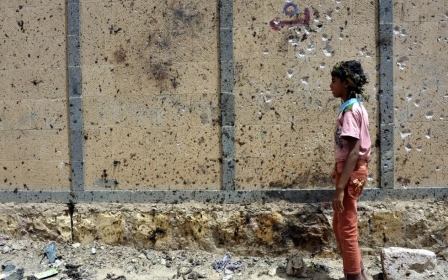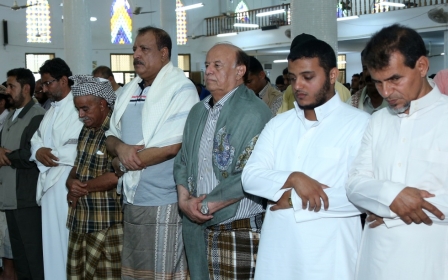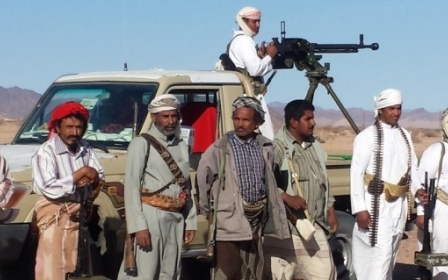Houthi militia seize Taez airport as Yemen on edge of civil war

The Shiite Houthi militia and its allies on Sunday seized the airport in the strategic Yemeni city of Taez from forces loyal to President Abedrabbo Mansour Hadi, security sources said.
Taez is located in central Yemen on the road between Sanaa, which the Houthis overran in September, and the southern city of Aden, to which Hadi fled last month after escaping house arrest in the capital.
Control of the city would enable the Houthis and forces loyal to former president Ali Abdullah Saleh, who was driven out in early 2012 after a year of bloody protests, to tighten the noose on Hadi.
Some 300 men, including Houthi fighters dressed in military uniforms and so-called special forces have deployed at the airport as reinforcements continued to arrive from Sanaa by air and land, the source said.
The special forces, previously known as the central security force, is a unit seen as close to Saleh.
"These soldiers are partisans of the former president Saleh," a military source told AFP.
Houthi militiamen also patrolled certain neighbourhoods of the city and expanded further south by setting up checkpoints in Raheda, some 80 kilometres (50 miles) south of Taez on the road to Aden, security sources said.
Houthi reinforcements began arriving in Taez on Saturday, a day after multiple suicide bombings that targeted Houthi mosques in Sanaa killed 142 people and wounded 351. The attacks were claimed by the Islamic State (IS) group.
On the other side, troops loyal to Hadi and southern paramilitary forces have deployed in Lahj province, north of Aden, in anticipation of a possible advance by Houthis, a military source said.
Hadi has been trying to cement his power base in Aden which he declared temporary capital after he retracted a resignation tendered under Houthi pressure.
On Thursday, his forces overran the base of special forces in Aden after its commander refused Hadi's decision to remove him.
US evacuates staff
Meanwhile, the United States said it had evacuated all its staff from Yemen, whose president has appealed for "urgent intervention" by the UN Security Council as attacks by Iran-backed Houthi militants bring his country nearer to civil war.
"Due to the deteriorating security situation in Yemen, the US government has temporarily relocated its remaining personnel out of Yemen," State Department spokesman Jeff Rathke said in a statement.
The UN Security Council is to hold an emergency meeting Sunday following Hadi's appeal.
In his letter to the Council, Hadi denounced "the criminal acts of the Houthi militias and their allies," saying they "not only threaten peace in Yemen but the regional and international peace and security."
"I urge for your urgent intervention in all available means to stop this aggression that is aimed at undermining the legitimate authority, the fragmentation of Yemen and its peace and stability," Hadi wrote.
Yemen has been torn by unrest since ex-strongman Ali Abdullah Saleh stepped down in early 2012.
Washington late on Friday pulled out troops from the Al-Anad airbase in southern Yemen amid fighting involving Al-Qaeda militants nearby which left at least 29 dead.
The US would "continue to actively monitor terrorist threats emanating from Yemen and have capabilities postured in the area to address them," Rathke said.
Yemen has acknowledged that US personnel gathering intelligence for drone strikes on Al-Qaeda are deployed at Al-Anad.
Houthi militia 'revolutionary steps'
Hadi pledged Saturday to fight Iranian influence in his country, accusing the Houthis of importing Tehran's ideology.
The Houthis vowed to take further "revolutionary steps" following Friday's blasts.
In his first televised speech since he fled to Aden from house arrest in Sanaa, Hadi said he would ensure that "the Yemeni republic flag will fly on the Marran mountain in (the Houthi militia's northern stronghold) Saada, instead of the Iranian flag."
"The Iranian Twelver (Shiism) pattern that has been agreed upon between the Houthis and those who support them will not be accepted by Yemenis, whether Zaidi (Shiites) or Shafite (Sunnis)," he said.
The Houthis belong to the Zaidi offshoot of Shiite Islam.
In a letter to relatives of the mosque bombings victims, Hadi condemned the attacks as "terrorist, criminal and cowardly".
"Such heinous attacks could only be done by the enemies of life," who want to drag Yemen into "chaos, violence and internal fighting", he said.
"Shiite extremism, represented by the armed Houthi militia, and Sunni extremism, represented by Al-Qaeda, are two sides of the same coin, who do not wish good and stability for Yemen and its people."
Hadi has declared Aden the country's temporary capital.
Friday's bombings came a day after clashes in the southern city between Hadi loyalists and
Since taking Sanaa the Houthis have tightened their grip on government institutions, aided by loyalists of former president Saleh.
But in their push to widen their control to the south, they have faced fierce resistance from Sunni tribes as well as Al-Qaeda militants.
Al-Qaeda distanced itself from Friday's bombings, insisting it does not target mosques.
In an online statement claiming responsibility, the Sanaa branch of IS said the attacks were "just the tip of the iceberg".
Mohammed Abdulsalam, spokesman for the Houthis' Ansarullah party, called the attacks part of a "clear war against the Yemeni people and its popular revolution." - a reference to the uprising that began in 2011, which the Houthis' claim to be continuing with their takeover of Sanaa.
"It is now imperative that we complete the revolutionary steps to protect the people and their revolution," he said in a statement.
Middle East Eye propose une couverture et une analyse indépendantes et incomparables du Moyen-Orient, de l’Afrique du Nord et d’autres régions du monde. Pour en savoir plus sur la reprise de ce contenu et les frais qui s’appliquent, veuillez remplir ce formulaire [en anglais]. Pour en savoir plus sur MEE, cliquez ici [en anglais].





